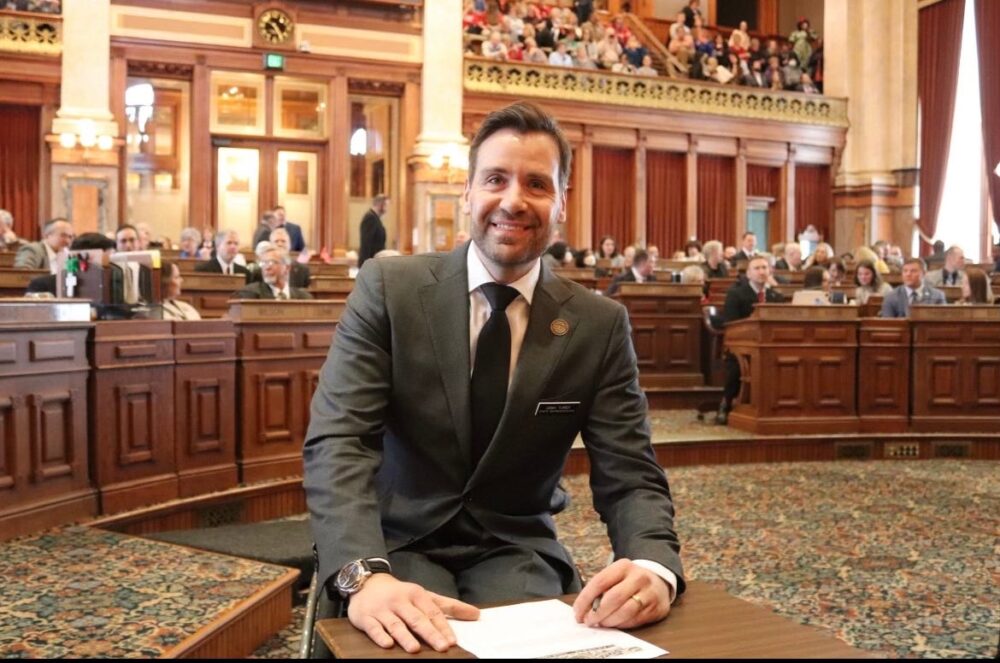Robin Opsahl covers the state legislature and politics for Iowa Capital Dispatch, where this article first appeared.
Iowans using wheelchairs through the state Medicaid program will no longer need a prescription and in-person doctor visit to get their wheelchairs repaired after a policy change by Iowa Department of Health and Human Services.
Democratic State Representative Josh Turek said in an August 13 interview that the measure proves advocacy can make a difference. Previously, Iowa Medicaid members were required to get a prescription and have a meeting with a health care provider in order to repair wheelchairs—a requirement Turek said was unnecessary, as wheelchair users have already been prescribed the equipment when they received it.
“This was just an unnecessary barrier that was causing an enormous amount of harm and suffering to the disabled population, delaying the process weeks or months for people to just be able to get a wheelchair repair,” Turek said.
These delays caused by the prescription requirement kept some Iowans with disabilities homebound for significant periods because they did not have a working mobility device, he said.
Turek, who uses a wheelchair, sponsored a “right to repair” bill in the 2024 legislative session that would remove the prescription and doctor’s visit requirements for wheelchair repairs under Medicaid, and would also allow disabled Iowans to earn more income without jeopardizing their Medicaid eligibility. While that legislation advanced from the House Health and Human Services Committee, it stalled in the House Appropriations Committee. On the last night of the 2024 session, House members unanimously approved a separate bill containing the right to repair language. However, the Senate did not take up that bill before adjourning for the year.
Though the legislation did not advance, the measure was still implemented. Beginning July 1, Iowa HHS changed its policy to no longer require a prescription for wheelchair repairs.
“The Iowa Department of Health and Human Services recognizes the concerns related to barriers and delays involving member wheelchair repairs and is working to best serve our members,” HHS officials wrote in a July 10 letter to medical equipment suppliers.
Turek linked the HHS administrative policy change with the discussions during the legislative session. The repair delays caused by prescription requirements “really wasn’t on on their radar” for HHS, he said, but advocacy by lawmakers and members of the disabled community prompted action by the state department.
“It may seem small to some people, but to the disabled population, this is a monumental change,” Turek said. “… This is directly what us as legislators should be doing, is working on policy to improve people’s lives, Iowans’ lives. And secondly, this is a huge win to show that advocacy and awareness can work. Because ultimately we weren’t able to get it across the finish line legislatively, but because of the attention that we brought to it and the advocacy that we did, we’re able to get it done.”
While the prescription and face-to-face visit requirements were lifted, wheelchair users on the state Medicaid program still need prior authorizations for equipment repairs—pre-approval from the managed care organization (MCO) or private insurer that is providing Medicaid coverage. This process can also take several weeks, Turek said—time in which the Medicaid recipient will not be able to get the needed repair.
“What will end up happening many times, is the repairman will be there, the provider will be at the house, they will have the (repair) equipment there, the ability to do so, and they say, ‘Well, I’m sorry, but we have to wait until we get this authorization,’” he said.
In future sessions, Turek said he plans to advocate for ways to reduce the wait time for the repair process through measures like requiring MCOs to respond to authorization requests within seven to 10 days, or lifting the authorization requirement for repairs that cost under $700.
“A lot of the issues that are happening to the disabled population are not happening out of malice, it’s just out of a complete lack of awareness and understanding,” he said. “So the more attention that I can help bring to Medicaid, and the more that we can work together on this, the more we’re going to be able to find continuous solutions like this. I hope we’re able to find some legislative solutions, but ultimately, I hope that just through advocacy of the disabled population, we’re able to do more like this where we can get it done just directly through policy change.”

